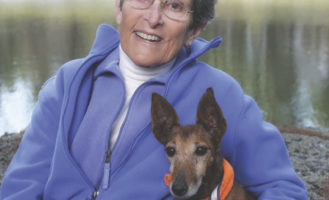We Were Slaves
The Jewish Community Unites Against Sex Trafficking
Sex trafficking—holding women, often very young women, as prisoners to serve in the sex trade. Not a subject usually discussed in Jewish circles. But a groundbreaking
conference in April 2013, sponsored by the UJA-Federation of New York, featured an anonymous young woman who managed to escape from her bondage and her pimp. It also spotlighted resources for victims, and heard from, among others, Atlanta rabbi Rachael Bregman, who called for stopping the problem at the demand side: the men who use these women for sex.
Here is one example of how sexual slavery can happen, as we heard at the conference. Sarah (not her real name), now in her early 20s, was raised in a quiet suburb in a Jewish home. Molested by a neighbor when she was nine, she never told; in her home, they never talked about sex. In her early teens she withdrew, showing signs of loneliness and vulnerability. A man in his twenties saw her and started talking to her after school as she stood alone. He selected Sarah carefully, ignoring the confident girls and focusing on vulnerable prey. “You’re so beautiful. You’re so wonderful,” he told her.
Suddenly, she felt visible, and more alive. He took her out, gave her nice things. She was curious to know more about sex since it had been so forbidden at home. He had sex with her. She didn’t like it, but by then it was too late. He told her she owed him for the gifts he had given her, and if she did not pay up he would beat her and rape her little sister. To make it up to him, she had to sell her body. He forced her to have sex with multiple partners each night, and to bring in cash—all of which he kept. When she fell short, he beat her, raped her, tore her clothes, forcing her to need more money from him to clothe herself. She was enslaved. As we learned at the conference, this is a typical approach for pimps to find, keep, control and terrorize their slaves.
In a Human Rights Shabbat sermon, I offered the following: If sex trafficking tramples on the basic human rights of the victims—the prostitutes themselves, who should more properly be called sex slaves—let’s consider the buyers, the “johns,” as the perpetrators of this denial of rights.
In a meeting in Atlanta, I mentioned these johns, and the laws that privilege them over the women: lower fines, shorter jail sentences and more frequently waived convictions. Lisa Williams, executive director of Wellspring Living for Girls, which provides victim services, interrupted. “We do not have to give these monsters such a nice name.” So what do we call them instead? “Rapists.” Then she added, “Or sexual predators, if you must.”
So who are these predators? The majority of the buyers are white, middle- and
upper-middle-class men, usually married with children. They can look like those usually gathered in a sanctuary on Shabbat. They are us. If not the people sitting next to you, then our friends, our family.
Most efforts to address human trafficking focus on victim services [see box]. While these are essential, they don’t address the problem’s sources. One way to curtail the trafficking of human beings as sex slaves is to curtail the demand.
Reduce the demand to reduce the supply. Educate young men on the realities of trafficking, the reasons women enter prostitution, the extent of violence in prostitution, and the physical and psychological harm suffered by prostituted individuals. Boys need to learn, too, about the conflicted feelings of men who use women in prostitution, and the potential adverse consequences that buying a person for sex can have on relationships with their own future romantic partners.
Let us demand from ourselves that we act to treat others as people, not property. We stand against the demand for buying and selling of people for sexual services by declaring that a john is not an innocent consumer, but indeed is a sexual predator.
HOW TO FIGHT MODERN DAY SEX SLAVERY
Train for Advocacy
FAIR (Free, Aware, Inspired, Restored) Girls provides comprehensive training to ensure that girls at high risk for being trafficked or sexually abused are better identified and protected. A fellowship program offers an intensive 12-week experience preparing future leaders in the anti-trafficking movement. FAIR Girls has trained over 175 young professionals and students who have gone on to work in public policy, international and local nonprofits, government jobs, and legal and social service positions. fairgirls.org
Help Free the Victims
A new hotline for tips about sex trafficking—The Polaris Project—helps people report suspected abuses to specialized human trafficking task forces and service providers. The project pushes for stronger federal and state laws through the National Human Trafficking Resource Center, which conducts trainings and helps connect survivors of human trafficking with vital services. There’s also an online library, and NHTRC provides training and technical assistance to strengthen local anti-trafficking efforts. Call 1-888-373-7888 or text HELP or INFO to BeFree (233733). polarisproject.org
Cut the Trafficking Pipeline
Make sure that corporations and government supply chains are free from human trafficking, forced labor and other forms of modern slavery. The Alliance to End Sex Trafficking (ATEST) is a coalition of U.S.-based human rights organizations working to end the slavery of labor and sex trafficking at home and around the world, and empowering survivors with tools for recovery. ATEST is led and supported by Humanity United, a foundation committed to advancing human freedom. endslaveryandtrafficking.org
compiled by Naomi Danis




